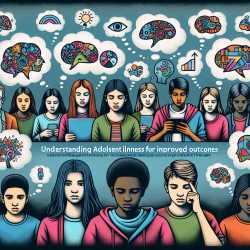Introduction
In the realm of speech-language pathology and therapy, understanding the intricate relationship between emotion regulation, social knowledge, and functional outcomes is crucial. Recent research by Macfie et al. (2023) sheds light on this relationship, particularly in youth at clinical high-risk for psychosis and outpatients with chronic schizophrenia. This blog explores the findings of the study and how practitioners can leverage these insights to improve therapeutic outcomes.
The Study at a Glance
The research focused on two understudied components of social cognition: emotion regulation knowledge and social knowledge. Conducted in two parts, the study involved 98 outpatients with chronic schizophrenia and 88 healthy controls, as well as 30 individuals at clinical high-risk for psychosis and 30 matched controls. Participants completed the Mayer-Salovey-Caruso Emotional Intelligence Test to assess their abilities in emotion and social management.
Key Findings
- Individuals with schizophrenia showed deficits in both emotion and social management compared to healthy controls.
- Youth at clinical high-risk for psychosis demonstrated deficits in social management but not in emotion management.
- Reduced social knowledge was consistently associated with poorer functional outcomes and increased negative symptoms.
Implications for Practitioners
These findings highlight the importance of targeting social knowledge in therapeutic interventions. Here are some strategies practitioners can implement:
- Focus on Social Skills Training: Incorporate activities that enhance social cognition, such as role-playing and social problem-solving exercises, to improve social knowledge.
- Integrate Emotional Intelligence Education: Use tools like the Mayer-Salovey-Caruso Emotional Intelligence Test to identify areas of need and tailor interventions accordingly.
- Collaborate with Multidisciplinary Teams: Work with psychologists and educators to create comprehensive intervention plans that address both social and emotional deficits.
Encouraging Further Research
While the study provides valuable insights, it also opens the door for further research. Practitioners are encouraged to explore the following areas:
- Investigate the long-term impact of social knowledge interventions on functional outcomes.
- Examine the role of cultural factors in emotion regulation and social cognition.
- Develop and test new intervention models that integrate social knowledge training with traditional therapeutic approaches.
Conclusion
Enhancing social knowledge is a promising avenue for improving functional outcomes in children at risk for psychosis and those with schizophrenia. By integrating these insights into practice, practitioners can make data-driven decisions that lead to better therapeutic outcomes. For those interested in delving deeper into the research, I encourage you to read the original study by Macfie et al. (2023).
To read the original research paper, please follow this link: Emotion regulation and social knowledge in youth at clinical high-risk for psychosis and outpatients with chronic schizophrenia: Associations with functional outcome and negative symptoms.










